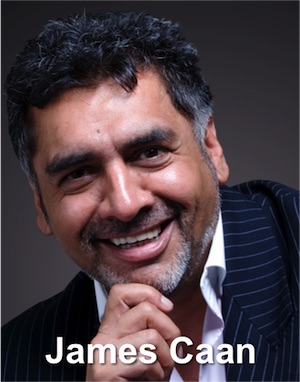James Caan is a serial investor who builds or buys businesses… and then sells them and moves on. He is one of the UK’s most successful and prominent entrepreneurs, with a nice-guy image. This image reflects his underlying business philosophy.

Short Biography
James Caan was born as Nazim Khan in Lahore, Pakistan, in 1960. Two years later, his family moved to the United Kingdom and, like so many immigrant families over the last few hundred years, they settled down and built a business in London’s East End – not far from where Lord Sugar grew up and got started.
Although his father wanted Caan to join the garment business he had started, Caan had other ideas. He left school, left home, and split with his father at the age of 16, and went west, to live in a flat in Kensington.
After a series of job placements made by a recruiting company, he decided he wanted to start his own business. But this was after helping his then future wife start her own fashion shop. He met her, interviewing her while working for a fashion recruitment agency, and promised to invest in her business, because he was attracted to her – not, I suspect he would now argue, the shrewdest of business justifications. With little capital of his own, he borrowed heavily, and luckily she made the business work.
Having worked for several recruitment businesses, he started his own in 1985: Alexander Mann. This was followed by others, as he started, expanded and sold businesses largely in the recruitment sector. Most notable were Alexander Mann (founded 1985, sold 2002) and Humana International (founded 1993, sold 1999). His LinkedIn profile will give you a sense of his energy.
In 2003, he returned to formal education for a year, joining Harvard Business School’s Advanced Management Program. On his return, he founded what is now his primary business, Hamilton Bradshaw. This is an equity investment business that specialises in the UK recruitment industry. Its portfolio currently (Summer 2016) consists of four recruitment businesses (with 9 others sold) and five other professional services businesses (with 1 other sold).
Between 2007 and 2011, Caan was a panelist on the successful BBC television series Dragon’s Den, alongside entrepreneurs including Deborah Meaden, Theo Paphitis, Peter Jones and Duncan Bannatyne. He left the series after frequent collaborator Bannatyne and he got into a dispute about the corporate structure of Hamilton Bradshaw and whether its funds are held off-shore.
In 2012, Caan was appointed Chairman of the Government’s Start-up Loans company, and in 2015, he was made CBE (Commander of the Order of the British Empire). He has written several books (including a best-selling autobiography, The Real Deal: My Story from Brick Lane to Dragons’ Den) and published a top-selling smart-phone App.
James Caan’s Business Philosophy
Caan became successful in his late 20s and has maintained a high work rate and exceptional success record ever since. His philosophy is simple:
Business is about people.
This is reflected by the overwhelming focus of his business investments; in people-focused businesses. This was also true in his investment choices in the Dragon’s Den series, although he did make a number of investments in product based businesses too.
He takes this further and says that good business is not about the quality of your transactions, but the quality of your relationships. We can see a reconciliation of relationship and transaction in one of the two pieces of advice he claims to have had from his father that influenced him significantly:
‘Always look for opportunities where both parties benefit.’
This very much matches a piece of advice in Fisher and Ury’s classic book on negotiation, ‘Getting to Yes‘:
‘Invent options for mutual gain.’
We have a blog about another key insight from that book, ‘Going round in circles: Problem Solving Simplicity‘
The other piece of advice Caan’s father gave him is also instructive:
‘Observe the masses and do the opposite.’
This seems to be a quintessential entrepreneurial attitude. However, I am not sure it is really at the heart of what has made Caan so spectacularly successful. For me, his formula seems equally simple. Looking at a succession of similar businesses that he has started, made profitable, and then sold on, I wonder if his philosophy s not something like this:
‘Observe what works and replicate it.’
